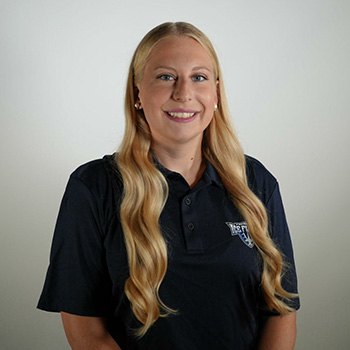
Sarah M. Wieck
Athletic Trainer, The Wichita Thunder, ECHL affiliate of the NHL's San Jose Sharks
While at UWF, Wieck was an athletic training student with the 2019 NCAA Division II National Championship Football Team. After graduating Cum Laude, Wieck accepted a graduate assistantship at Missouri State University and Mercy Sports Medicine. Wieck was the head athletic trainer for the Pensacola Ice Flyers and head athletic trainer for Missouri State’s ACHA Division I & II Men’s Hockey teams, attending the national tournament both years.
Tell us a bit about your job as an athletic trainer for The Wichita Thunder.
As the head athletic trainer for the Wichita Thunder, I am responsible for the health and wellness of the team. Everything from injury prevention, evaluation and diagnosis of injuries, treatment and rehabilitation, to health care administration and documentation for the league. I am with the team every day from the beginning of October until postseason.
When did you know this was what you wanted to do?
I’ve known I wanted to work in medicine since I was young. It wasn’t until my senior year of high school I found athletic training and realized it put my two loves together: sports and healthcare. As for hockey, I grew up watching it. My dad and brother have always been fans, and in turn, I grew up loving it. When it came time to hone in on what setting I wanted to work in as an athletic trainer, professional hockey was the path that interested me (even though it is one of the hardest sports to work in as a female athletic trainer).
How has UWF helped you succeed in your career?
The University helped me grow as an individual. I joined a sorority (Kappa Delta), and it really helped me grow my confidence, which is really important when you are responsible for the well-being of more than 20 athletes. While I was doing my clinical rotations, I worked with UWF football (fall 2019 and 2020), and that prepared me for the long hours that come with being an athletic trainer. It also came with lots of injury exposure. It’s easier to stay calm around an injured player when you have been there before.


